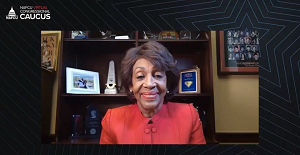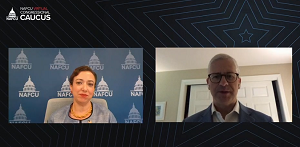Newsroom
Waters, McHenry talk COVID-19 relief, CU priorities at Caucus

Attendees of NAFCU's Virtual Congressional Caucus Tuesday got insights into Congress' efforts on coronavirus relief and other credit union priorities – including Bank Secrecy Act (BSA) and E-SIGN reforms – directly from House Financial Services Committee Chairwoman Maxine Waters, D-Calif., and Ranking Member Patrick McHenry, R-N.C.
Waters touted the "instrumental role" credit unions have played in supporting their members and communities through the pandemic, including the industry's participation in the paycheck protection program (PPP) to provide loans to "the smallest of small businesses that really need help the most."
Waters also discussed her and the committee's efforts to respond to the crisis, as well as the House-passed HEROES Act. She said she will continue to be a proponent of funding for Community Development Financial Institutions (CDFIs) and Minority Depository Institutions (MDIs) to ensure they can provide financial access and services to minority and low-income communities. She also noted credit unions' call for extended CARES Act provisions related to troubled debt restructurings (TDRs) and the NCUA Central Liquidity Facility (CLF), for which NAFCU continues to advocate in future coronavirus relief packages, and encouraged credit unions to keep up their engagement with Congress to ensure lawmakers are aware of what relief the industry and its members need.

In his opening remarks, McHenry called for bipartisan work on another relief package to address the health and economic risks of the pandemic. He noted the effectiveness of the CARES Act and said more needs to be done address long-term recovery and rebuilding through innovative solutions.
Among the solutions he outlined were bringing the technology gains of the past 20 years into financial services and regulation, including as it relates to BSA/anti-money laundering (AML) regulations and data security.
NAFCU Executive Vice President of Government Affairs and General Counsel Carrie Hunt joint McHenry for a Q&A following his remarks to dive further into some of these issues. Hunt highlighted NAFCU's work to obtain E-SIGN Act modernization, and McHenry agreed that technology can greatly improve authentication and traditionally paper-based processes. As regulators look past the pandemic, McHenry encouraged them to "take a full scale review" of what's required of credit unions and consider the "huge strides [the regulators] have permitted in the last six months" to make regulation more effective.
On data security, McHenry stressed that financial institutions have the highest regulatory expectations when it comes to maintaining and protecting consumers' information and there needs to be conversations around those that are not currently held to those standards. He called on credit unions to drive the conversation related to data security and data privacy, and to advocate for the information consumers need to know and who has rights to their financial information. NAFCU is a leader in calling for national data security and data privacy standards.
For those Caucus attendees who weren't able to catch all sessions live, on-demand recordings will be available for 14 days after airing. Recaps of other sessions from the two-day event are available in NAFCU Today and highlights can be found on Twitter with #NAFCUCaucus.
Share This
Related Resources
NAFCU S. 2155 Analysis
Charts
Compliance Monitor - December 2018
Newsletter
Compliance Monitor - June 2018
Newsletter
Get daily updates.
Subscribe to NAFCU today.
